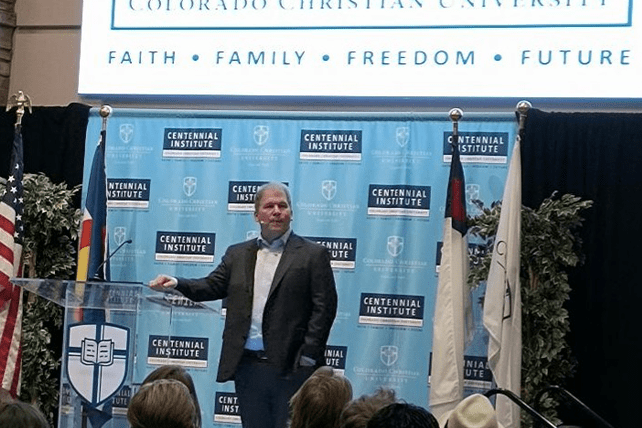At the inaugural Centennial Impact Summit on Sept. 26 and 27, speakers addressed technology’s role in shaping how humans see themselves, other people, and God. The event—held at Colorado Christian University in Lakewood, Colorado—was titled “Theology, Technology, and Anthropology: Reclaiming Embodiment in a Brave New World.”
The first keynote speaker, “BreakPoint” co-host John Stonestreet, explored the “permanent identity crisis” Americans have been experiencing in the digital age. Stonestreet, an author and president of the Colson Center, discussed the confusion people now face about what it means to be human. In the marketplace of ideas, he argued, Christians have the most profound, stable answer to that question: We are made in the image of God.
John Stonestreet on Humanity’s Confusion
While opening the Centennial Impact Summit on Friday, John Stonestreet pointed to modern-day conversations about humans that once would’ve been considered “absurd.” For example, now when someone describes feeling trapped inside the body of a different gender, many people simply accept that as truth. Gender-identity treatment is framed as either of two extremes: “mutilation” or “life-affirming care.” And abortion is categorized as either “murder” or “life-saving care.”
Those differences are “due to radically different views of what it means to be human,” said Stonestreet. Society now encourages people to “be themselves” and stop hiding sinful lifestyles, offering affirmation and support rather than reproach.
Pointing to philosopher Friedrich Nietzsche’s “Parable of the Madman,” Stonestreet said Western culture’s dismissal of God has led to the loss of our reference point. Without God as our “true north,” the compass of life always points back to ourselves, said Stonestreet, and “if you’re the center of the universe, you’re always lost.”
Made in God’s Image: Why That Matters
Although most Christians agree that God made people in his image, they don’t know what that means, according to John Stonestreet. The early church’s councils and creeds didn’t address the topic, he noted, yet it should be a fundamental part of the theological catechism.
Now that technology has put the concept of being human “up in the air,” Stonestreet said, it’s especially crucial for Jesus’ followers to understand the concept of being God’s image-bearers. That idea is “perhaps the most consequential idea in the history of the world,” he argued. American culture has taken for granted human value and dignity, but it’s the “idea to which the world owes its entire Democratic inheritance.”
It’s also the ideal that set America on its trajectory, Stonestreet explained. On the outside, human equality isn’t self-evident, because of people’s vast external differences. So the evidence of equality must be based on what’s inside—our commonality of being created in God’s image.
The language of Genesis separates humans as exceptional among God’s created beings, Stonestreet said, and our human identity is at the core of all modern cultural debates. “We become what we worship, and we see other people in the image of whatever we worship,” he said, referencing Psalm 135:18. Humans have assigned god-like status to the idols of sex, state, science, stuff, and self; in turn, those idols have become “profoundly dehumanizing.”
Self is the ultimate idol, said Stonestreet, because “you won’t find yourself by looking at or within yourself.” That’s true on individual and societal levels, he said, warning that worshiping the self leaves us and our culture “hollowed out.”

